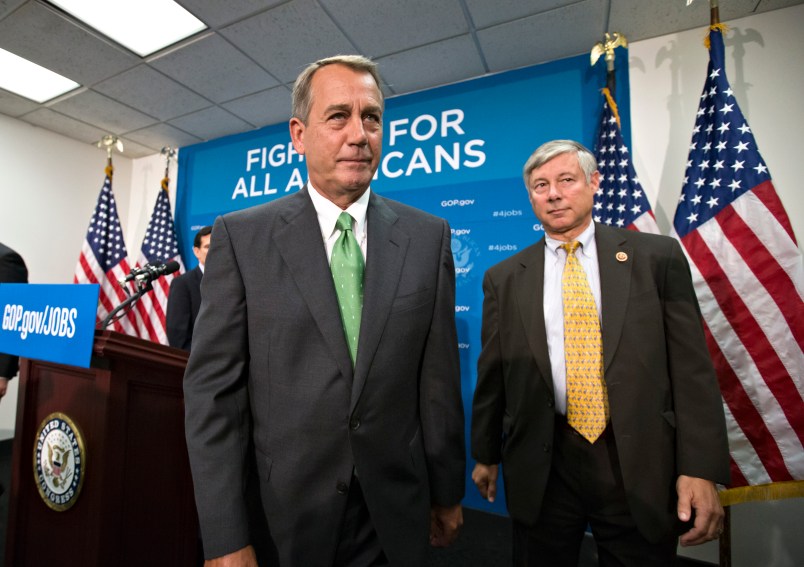House Republicans have teed up a vote this Friday on legislation aimed at letting Americans hold on to their health insurance plans next year.
The vote on the two-page “Keep Your Health Plan Act,” sponsored by House Energy & Commerce Committee Chairman Fred Upton (R-MI), comes amid a swirl of controversy surrounding President Barack Obama’s promise that individuals who liked their policies wouldn’t lose them. The president apologized last week to those who have lost their insurance coverage, but maintained that Obamacare fixes major flaws in the system while preserving the status quo to the extent possible.
Speaker John Boehner (R-OH) said the Upton bill would “allow anyone with a health care plan they like to keep it.” That’s not exactly right. While it would permit insurance companies to continue existing policies — plans that were in effect as of Jan. 1 of this year — into 2014 even if they don’t meet Obamacare’s essential benefits standard, it would not require them to do so. Insurers would still be able to cancel or replace those policies.
Under Upton’s bill, insurers may continue to sell existing policies outside the insurance exchanges — to anyone, even new customers — next year. Some people would end up keeping their existing plans and waiting a while longer before buying on the exchanges. That could arguably be good news for the young, affluent individuals who stand to pay more under Obamacare. But it would disrupt the fragile actuarial models of insurers, who have based their range of policy options and premiums on the assumption that those individuals would be participating in the new marketplaces.
“There are concerns about how this would work operationally,” said Robert Zirkelbach, a spokesman for America’s Health Insurance Plans, the industry’s top lobbying group. “The goal of letting people keep their plans is a good one. But there are a number of outstanding questions that would have to be addressed for this to work as intended.”
Nicholas Bagley, a professor of health law at the University of Michigan, pointed out that those who currently have policies on the individual market tend to be healthier than most — if not, they’d probably be priced out or locked out due to a preexisting condition. “If those relatively healthy people can keep their current plans outside the exchanges, they won’t enter the same risk pool as everyone else on the exchanges,” he said. “That means the exchanges will have a higher proportion of unhealthy people shopping for insurance than anticipated.”
“In the long run, that will drive up the cost of insurance on the exchanges,” Bagley said. “In the short run, it could mean that the prices at which insurers are selling their plans are too low to cover the medical costs of those who enroll. Because the adoption of the Upton bill would wreak havoc with their actuarial models, insurers are likely to resist its adoption.”
Austin Frakt, a health economist at Boston University, agreed with Bagley’s assessment.
Zirkelbach of AHIP pointed to two other concerns insurers have with the Upton bill. The first is that insurance is heavily regulated on the state level, so federal permission wouldn’t necessarily be enough to allow plans to continue. Second, he noted that some insurance policies have already been canceled or replaced based on existing laws and regulations. “The question is, could those policies be opened back up?” he said. “And how long would that take, how would states respond and what impact would that have?”
There’s also the view that insurance plans will ultimately have to offer a basic standard of coverage, as Obamacare intended, and it makes little sense to delay the inevitable.
“It does not stand in the long-term best interest of the health care system or of individuals purchasing these plans,” said Dan Mendelson, a former top health official in the Clinton White House who now runs the consulting firm Avalere Health. “The Affordable Care Act was enacted in large part to address concerns about underwriting on the basis of disease, the lack of coverage for preventive services, and high administrative cost associate with individual policies. This bill would memorialize those practices. As difficult as it is to transition our healthcare system, reform offers an insurance market that bans experience underwriting, offers free prenatal care and caps administrative overhead.”
The GOP bill doesn’t appear to have legs in the Senate, at least for now. But if the Obamacare website, HealthCare.gov, isn’t fixed by the end of this month, as the White House has promised, Democratic leaders will face greater pressure to make changes to the law. Similar proposals have been offered by vulnerable Democrats who are up for re-election in 2014.
Appearing Tuesday on CNN, Senate Majority Whip Dick Durbin (D-IL) said Democrats are willing to make constructive changes to improve Obamacare, but brushed off the Upton bill when asked about it. “Some of those proposals are not friendly proposals,” he said. “They’re designed to derail this effort.”
White House spokesman Jay Carney told reporters Tuesday that the Upton bill is “not an effective fix” to Obamacare. He said it “would cause more problems and create more problems and do more harm. … Broadly speaking we do not see that as fixing the problem. We see that as throwing the baby out with the bath water.”






